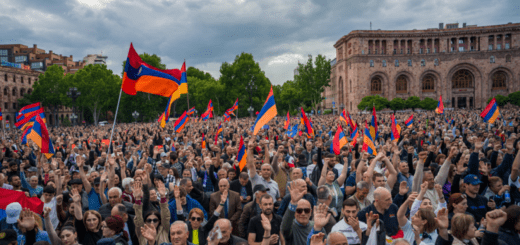Pashinian’s Party Avoids Campaign Funding Probe

By Shoghik Galstian
RFE/RL Armenian Service
Armenian prosecutors have refused to launch a formal criminal investigation into a recent report that questioned the legality of lavish campaign donations received by the ruling Civil Contract party ahead of last September’s municipal elections in Yerevan.
The party led by Prime Minister Nikol Pashinian claimed to have raised 506.5 million drams ($1.25 million) for its election campaign from about a thousand donors during a single event organized in August.
In an extensive article published on January 30, the investigative publication Infocom.am revealed that the bulk of that sum was generated by donations ranging from 1 million to 2.5 million drams, the maximum amount of such contributions allowed by Armenian law. It said that their nominal donors included presumably non-rich people linked to senior government officials and businesspeople as well as ordinary residents of Yerevan who could hardly afford such payments.
When contacted by Infocom reporters, many of those residents claimed to be unaware of the hefty sums wired to Pashinian’s party on their behalf through a commercial bank owned by Khachatur Sukiasian, a wealthy businessman and pro-government lawmaker.
Armenia’s Office of the Prosecutor-General told RFE/RL’s Armenian Service on Tuesday that it has looked into the report and found no evidence of financial irregularities committed by Pashinian’s party. It said it will therefore not open a criminal case. Prosecutor-General Anna Vardapetian previously worked as a legal adviser to Pashinian.
Vardine Grigorian, a civic activist representing the Vanadzor-based Helsinki Citizens’ Assembly, criticized the prosecutors, saying that their refusal to investigate Civil Contract reflects a lack of political will.
“The lack of political will led to the choice of an easy path: to believe that a person earning, say, 120,000 drams [per month] enthusiastically donated 2.5 million drams,” said Grigorian.
Last month, Pashinian declined to explain these and other donations deemed suspicious by the investigative journalists while denying any lack of financial transparency within his party. Speaking in the Armenian parliament, the premier said he and his political team “intend to understand and explain what happened.”
Pashinian’s team has still not given any explanations. Its detractors accuse it of coercing wealthy businesspeople to contribute large sums exceeding the legal limit and using money generated by the illicit enrichment of the ruling party’s members and supporters.
The Infocom article shed light on such donors as well. They include five former officials from the Armenian Ministry of Emergencies. The 2.5 million drams ($6,170) donated by each of them is a sum comparable to their annual salaries. Armen Pambukhchian, a senior Civil Contract figure, headed the ministry until becoming the party’s election campaign manager last July.
Other dubious donors work for companies belonging to businessmen thought to be on good terms with Armenia’s current leadership. Yeremian Projects, a restaurant holding company, employs eight such individuals who gave Civil Contract 2.5 million drams each.
Pashinian pledged to separate business from politics when he swept to power during the 2018 “velvet revolution.” He said afterwards that his party will rely on modest donations from large numbers of supporters to finance its election campaigns. Almost 70 percent of the money officially raised by it for the Yerevan mayoral race came from 2.5 million-dram donations made by 140 persons.







